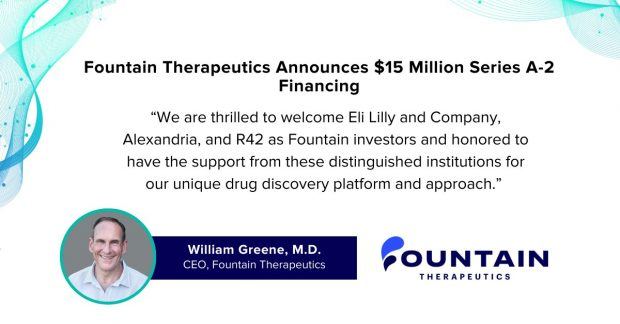One day in the future when you need medical care, someone may examine you, diagnose the problem and provide you with a personalized therapy. Or even better, they might be able to bend the trajectory of your disease. This is the dream of modern medical science, which will be made possible by artificial intelligence.
What it means to age is changing, and William Greene, MD, CEO of Fountain Therapeutics, is one of those driving the change. Rather than focusing on lifespan, he and his company are focusing on healthspan, and in particular, the impact of chronic degenerative diseases. Their goal is to develop therapeutics using artificial intelligence that restore the resilience of your cells.
In this episode of The Business of Health ,Gisèle Wertheim Aymés speaks to William Greene MD on striving to extend human healthspan.
Extending human healthspan through artificial intelligence
“We are focused on discovering and developing important therapies for the biggest diseases of our time, which are chronic diseases of aging. And to do so, we are taking a really fresh approach to understanding, and hopefully treating, these devastating diseases, which include frailty, loss of the immune system as we age, chronic heart disease, etc.”
Fountain Therapeutics is a biopharmaceutical company building a pipeline of disease-modifying therapeutics for chronic degenerative diseases, by restoring cellular resilience. “We have developed, using artificial intelligence and computer vision, a very precise method of measuring the age of cells that we take out of a body. We use that to score the actual biologic age of cells we treat with drugs. So, we look for the ability of a new potential therapy to actually increase the resilience and improve the health state, if you will, of individual cells in the body,” says Greene.

Fountain Therapeutics was founded with the belief that a future in which we live healthier lives longer is more desirable than one in which we continue to be afflicted by the disease of aging.
“We are very much a discovery company. We are taking an unbiased approach to looking at, hopefully, the fundamental causes of why we develop these chronic diseases as we age – then using that understanding to discover new therapies.”
Artificial Intelligence is revolutionizing drug discovery
Artificial intelligence (AI) has become an important area of research in virtually all fields, and it is revolutionizing drug discovery and development given that it enables the analysis of large data and discover patterns hidden deep within complex images and data sets that we would otherwise miss with general tools.
“Nothing can ever be 100% perfect. Nothing can be 100% safe. Certainly nothing can be 100% tailored, I think, to an individual, but if we can make more people respond more strongly to specific medicines, and avoid the potential downsides that every medicine may have, then we can make a really big advance.
Photo: Shutterstock
“We think our artificial intelligence platform may be very well suited for this, so we envision a future where, not only do we have a set of drugs for something like Parkinson’s disease or Alzheimer’s, but we may be able to use your cells from your body as a diagnostic to predict that a particular therapy may work better for you than another person.”
Clearly, science and technology are being brought together to create advanced, new therapies. These treatments may help researchers learn how cells respond to different therapies. One day, this research may lead to treatments for macular degeneration, Alzheimer’s disease, and other incurable diseases.
Watch The Business of Health video
The video interview contains the full dialogue of this interview, and you can watch it below. The Business of Health is powered by Longevitylive.com, produced by The Nielsen Network.




![women [longevity live]](https://longevitylive.com/wp-content/uploads/2020/01/photo-of-women-walking-down-the-street-1116984-100x100.jpg)










